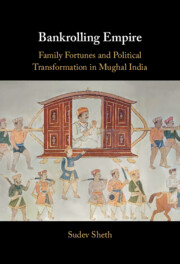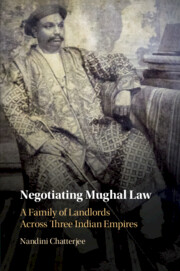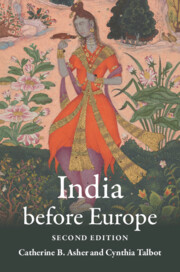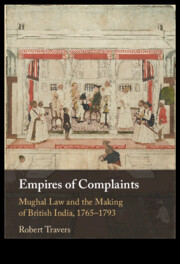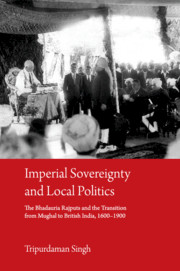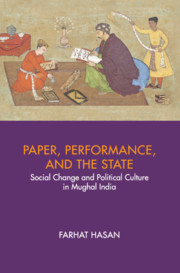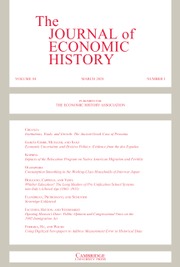Bankrolling Empire
Family Fortunes and Political Transformation in Mughal India
- Author: Sudev Sheth, University of Pennsylvania
- Date Published: November 2023
- availability: Not yet published - available from October 2024
- format: Hardback
- isbn: 9781009330268
Hardback
Other available formats:
eBook
Looking for an inspection copy?
This title is not currently available for inspection. However, if you are interested in the title for your course we can consider offering an inspection copy. To register your interest please contact [email protected] providing details of the course you are teaching.
-
By the 1660s, the mighty Mughal Empire controlled the Indian subcontinent and impressed the world with its strength and opulence. Yet hardly two decades would pass before fortunes would turn, Mughal kings and governors losing influence to rival warlords and foreign powers. How could leaders of one of the most dominant early modern polities lose their grip over empire? Sudev Sheth proposes a new point of departure, focusing on diverse local and hitherto unexplored evidence about a prominent financier family entrenched in bankrolling Mughal elites and their successors. Analyzing how four generations of the Jhaveri family of Gujarat financed politics, he offers a fresh take on the dissolution of the Mughal empire, the birth of princely successor states, and the nature of economic life in the days leading up to the colonial domination of India.
Read more- Utilizes a wide range of unconventional sources, newly translated from an astonishing sweep of Asian and European languages, including Persian, Sanskrit, Gujarati, and French
- Offers comparative analyses of recently tapped data from imperial, colonial, regional, and private archives which contribute to novel perspectives about townsfolk, entrepreneurs, and leaders caught in the interstices of competing political systems
- For scholars and students of South Asian and global history, comparative early modern studies, business history, family enterprise, and political change
Reviews & endorsements
'A remarkable account, path-breaking in its detail, of the shifting relations between private finance and political power in 17th & 18th century India: drawing on original sources, ranging across multiple languages, and moving between microscopic and wide-angled perspectives, Sheth traces the fortunes of a family of Jain bankers, revealing how they calculated and conducted their relations with political power during critical times – surviving the decline of Mughal power, the expansion of British control and the ambitions of local rulers, to emerge as a significant industrial house today. Necessary reading – not just for historians of late Mughal India, but for anyone interested in business history and in historical relations between private capital and state power.' Sunil Khilnani, Ashoka University
See more reviews'How a dynasty of indigenous merchants and bankers in Gujarat made and unmade the fortunes of local rulers. A deeply researched study that lifts the Orientalist curtain which still shrouds the nexus between money and power in premodern Asia.' Francesca Trivellato, Institute for Advanced Study
'Sheth employs an intergenerational study of a family of Gujarati financiers to provide original and rich narratives about family business, the relationship between business and politics, and the decline of the Mughal empire. The use of unconventional primary sources, written in eleven Asian and European languages, is extraordinarily impressive.' Geoffrey Jones, Harvard Business School
'Following the fortunes of a merchant-banking family in western India across four generations, Bankrolling Empire weaves a rich and exciting narrative of the inter-dependence between merchant capital and state formation in Mughal India. This book is a must read for scholars interested in state-society relations, banking firms and social transformations in early modern South Asia.' Farhat Hasan, University of Delhi
'This delightful book uses the prism of family history to address a longstanding debate in the history of the Mughal empire, that of the evolving role of merchants in sustaining, and later dismantling the regime. Based on remarkable multi-lingual research, it is a major contribution to South Asian history.' Nandini Chatterjee, University of Exeter
'An important contribution to the study of early modern India. By tracing the activities of several prominent Gujarati banking families across multiple generations, Sudev Sheth resolves a long-standing debate over the Mughal empire's dependency on indigenous financiers, and whether their withdrawal of lending services had led to imperial collapse.' Richard M. Eaton, University of Arizona
'Innovative in its concepts, and creative in its use of a range of historical materials, Bankrolling Empire is a welcome and original attempt to illustrate the transition from the Mughal to the British empire from the hitherto-neglected perspective of the Indian families who financed both. Sheth's work will be of equal interest to students of the Mughal empire and of the growing field of business history in India.' Abhishek Kaicker, University of California, Berkeley
'This book combines deep analysis and wide research in a study of how successive phases of the Mughal, Maratha and early British empires interacted with the entrepreneurial careers of two important Indian capitalist families. It is a pathbreaking contribution to our understanding of global capitalisms in the early modern world.' Sumit Guha, University of Texas, Austin
Customer reviews
Not yet reviewed
Be the first to review
Review was not posted due to profanity
×Product details
- Date Published: November 2023
- format: Hardback
- isbn: 9781009330268
- length: 379 pages
- dimensions: 235 x 155 x 23 mm
- weight: 0.73kg
- availability: Not yet published - available from October 2024
Table of Contents
Introduction
1. Prelude: The Mughal Empire, 1526–1750
2. Courtly mutualism: the emperor's jeweler Shantidas Jhaveri, 1628–1658
3. Political commensalism: Manekchand Jhaveri and bankrolling bids to the throne, 1658–1707
4. Interlude: cultivating financial crisis under Aurangzeb, 1660s–1719
5. Expedient extortion: the governor's golden goose Khushalchand Jhaveri, 1719–1730
6. Competitive coparcenary: Vakhatchand Jhaveri and brokering politics, 1730–1818
7. Postlude: Bankrollers of Mughal succession, 1750–1818
Conclusion
Appendices
Glossary
Bibliography
Index.
Sorry, this resource is locked
Please register or sign in to request access. If you are having problems accessing these resources please email [email protected]
Register Sign in» Proceed
You are now leaving the Cambridge University Press website. Your eBook purchase and download will be completed by our partner www.ebooks.com. Please see the permission section of the www.ebooks.com catalogue page for details of the print & copy limits on our eBooks.
Continue ×Are you sure you want to delete your account?
This cannot be undone.
Thank you for your feedback which will help us improve our service.
If you requested a response, we will make sure to get back to you shortly.
×
